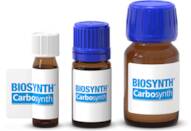Thyrotropin-Releasing Hormone (TRH)
CAS : 24769-58-2
Ref. 3D-FT73641
| 2mg | Arrêté | ||
| 5mg | Arrêté | ||
| 10mg | Arrêté | ||
| 25mg | Arrêté | ||
| 50mg | Arrêté |
Informations sur le produit
- 5-Oxo-<span class="text-smallcaps">L</smallcap>-prolyl-<smallcap>L</smallcap>-histidyl-<smallcap>L</span>-proline
- 5-Oxo-Pro-His-Pro
- 5-oxo-L-prolyl-3-(4H-imidazol-4-yl)-L-alanyl-L-proline
- <span class="text-smallcaps">L</smallcap>-Proline, 1-[N-(5-oxo-<smallcap>L</smallcap>-prolyl)-<smallcap>L</span>-histidyl]-
- <span class="text-smallcaps">L</smallcap>-Proline, 5-oxo-<smallcap>L</smallcap>-prolyl-<smallcap>L</span>-histidyl-
- <span class="text-smallcaps">L</smallcap>-Pyroglutamyl-<smallcap>L</smallcap>-histidyl-<smallcap>L</span>-proline
- Acid thyroliberin
- Acid-TRH
- Deamidated TRH
- Deamido-TRH
- Voir d'autres synonymes
- Deamido-thyrotropin-releasing factor
- Deamino-thyrotropin releasing hormone
- Proline, 1-[N-(5-oxo-<span class="text-smallcaps">L</smallcap>-prolyl)-<smallcap>L</smallcap>-histidyl]-, <smallcap>L</span>-
- Pyr-His-Pro-OH
- TRH (free acid)
- TRH acid
- Thyrotropin-releasing hormone free acid
- Trh-Oh
- L-Proline, 5-oxo-L-prolyl-L-histidyl-
- L-Proline, 1-[N-(5-oxo-L-prolyl)-L-histidyl]-
- Proline, 1-[N-(5-oxo-L-prolyl)-L-histidyl]-, L-
- 5-Oxo-L-prolyl-L-histidyl-L-proline
- L-Pyroglutamyl-L-histidyl-L-proline
Thyrotropin-Releasing Hormone (TRH) is a peptide hormone that is released by the hypothalamus and stimulates the release of thyroid-stimulating hormone from the anterior pituitary gland. TRH can be administered in the form of a dietary supplement for use as a drug against obesity, although it has not been approved for this indication. It has been shown to modulate skin cells in vivo and increase phosphatidylcholine levels in micelles, which may lead to an improved skin barrier function. TRH binds to high affinity binding sites in the paraventricular nucleus of the brain and pancreatic tissue, but has low resistance against hydrolysis by enzymes such as phospholipases.
TRH is also used to transfect cells with high resistance to it, making it useful for experiments involving micelles and modulating skin cells.





